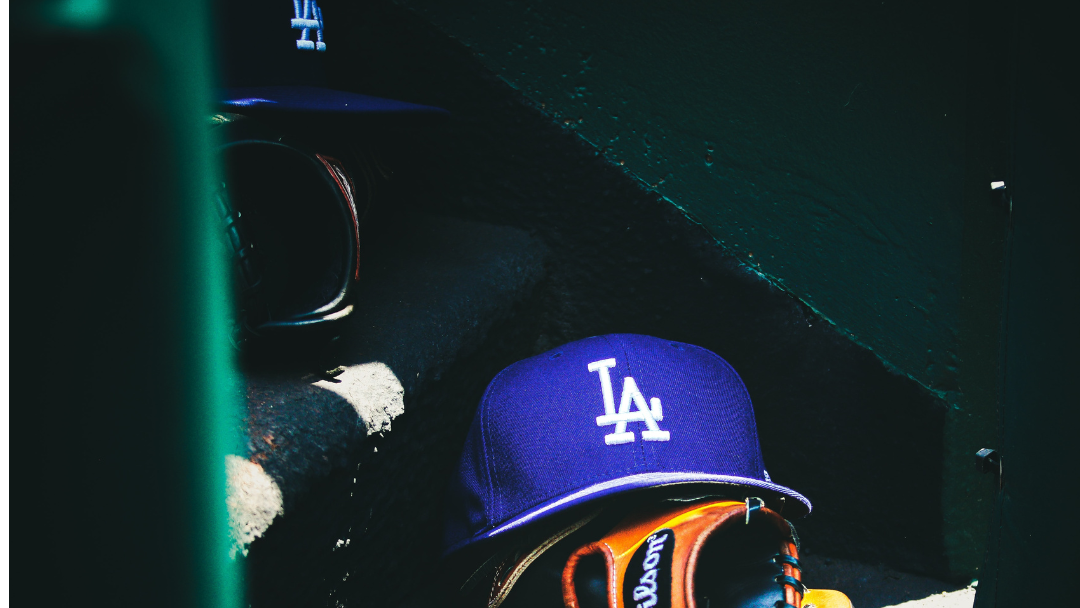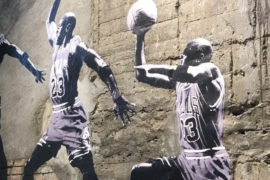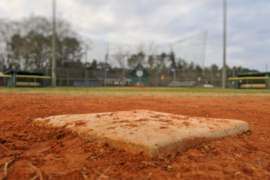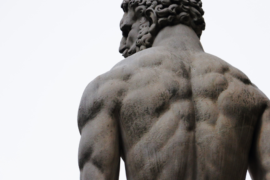LIKE MOST THIRTY-SOMETHINGS WORKING AT HOME, ALONE, DURING THE PANDEMIC, I frequently found myself scanning dog adoption websites. Among the most common names I’d see in Massachusetts shelters: Mookie. Among the most common names I’d see in Los Angeles shelters, after I moved cross country: Mookie.
Which, phonetically, in a vacuum without any baseball context, is a wonderful name for a dog: an inherently fun name to say out loud, two varying syllables ending with the uplifting EE sound, a word that requires your mouth to shift from more closed, pursed lips to the much more open, wider beginnings of a grin, a name that essentially requires you to begin smiling as you finish saying it—no matter how upset you are that your golden retriever puppy gifted your new rug a pile of Splatamir Putin.
Which is all to say: Mookie is a wonderful name for a dog, an especially wonderful name for a dog whose most-famous baseball namesake himself plays with the most puppy-like abandon and backyard, Little League joy (my Little League coach from 20 years ago, who voluntarily spent his free time encouraging 12-year-olds to swing away and dive in the outfield grass, has a golden doodle named Mookie who often wears a Mookie Betts jersey—just to hammer home this point. If “Riggins” once held the championship belt for sports-figure-inspired dog names, fictional or otherwise, Mookie firmly holds it now.).
That Mookie Betts’ stats, through his 20s, strikingly resemble Ken Griffey Jr.’s stats through his 20s, somehow seems secondary in the Mookie Betts experience. That his career WAR, at age 29, (Wins About Replacement, meaning cumulative wins added to his team, relative to a fringe, replacement-level Major League player) has already outpaced hall-of-famers Hank Greenberg, Orlando Cepeda, and David Ortiz (!) and will soon surpass all-time-all-universe Ichiro, Wilie McCovey, and Tony Gwynn also, somehow, seems secondary.
I watch Mookie Betts, first and foremost, to be reminded what recess looks like: the excitability, delight, and looseness, the smallest player on the biggest diamond taking the biggest hacks, the almost-little brother defiance to his urgent swings on the first pitch he sees, the recklessness with which he plays right field and how freely he leaps above and on it, the chest-thumping and celebratory shouting that never registers as bravado or antagonizing but rather as raw thrill and raw joy, the most talented player on the field who also has the dirtiest jersey.
I watch Mookie to remember limitlessness sandlot baseball, in a professional league full of limits and pitch clocks and disappearing advertising space on outfield walls and hopelessly-limited small-market teams and hopelessly-limited minor leaguers unable to make a living and $14 Bud Lights and teams run by billionaires forcing local taxpayers to pay for their new stadiums then charging the most expensive tickets in the league yet claiming they can’t afford to resign their once-in-a-generation, homegrown stars once they’ve hit salary arbitration—when they absolutely can afford to—when they’d rather buy a Premier League soccer team for shits and giggles, or an expansion NBA team, or another yacht, than support the team on the field and its most feel-good, transcendent young players.
I watch Mookie to distract myself from how my favorite team unforgivably traded him two and a half years ago.
I watch Mookie, still, always, and only see him now in his Dodgers uniform, just as Spike Lee’s Mookie wears in Do The Right Thing—with “42” and “Robinson” sewn into the jersey, 30 years after his Brooklyn (Trolly) Dodgers moved to a city, 3,000 miles away, without trolleys. The right thing, I tell myself, is continuing to root for my favorite player while my favorite team suffers through administrative ineptitude and moral bankruptcy.
And I watch Mookie to point myself towards Rumi’s poem “Out Beyond Ideas,” of all things:
“Out beyond ideas of wrongdoing and rightdoing/there is a field. I’ll meet you there.”
Mookie’s birth name, of course, is not Mookie. His full name is Markus Lynn Betts. While he was a newborn in Nashville, his parents would watch NBA all-star point guard Mookie Blaylock, then playing for the nearest team, the Atlanta Hawks, leading the league in steals—sort of an East Coast Gary Payton Lite. (“Mookie Blaylock” is itself a nickname for Daron Oshay Blaylock.)
“I know that I rarely call the people I love by their names,” the poet Ross Gay writes in The Book of Delights. “I call them, if it is okay with them, by the name I have given them. I wonder if this means I think of my beloveds as my children.” I call my younger sister, Susannah, six different names, none of which is Susannah: Susnah (how her dyslexia misspelled Susannah on the PSATs, how prospective colleges then exclusively addressed her in the mail), Sus, Annie, AG (her initials with “Annie”), “age” (the one-syllable, phonetic pronunciation of AG), and Pretz (as in Pretzel, as in Aunt Annie, a title which she now holds, as in Aunt Annie’s pretzels).
Gay continues, referencing his friend Curtis whom he calls Boogie: “Boogie doesn’t know that every time I say his name I am also invoking the great and similarly nicknamed L-Boogie, or Lauren Hill, whom I am guessing, wrongly, probably rightly, Boogie has never boogied to.”
Unlike Boogie, though, Mookie Betts could conceivably Mookie like Blaylock. I’m sure he could pivot to the hardwood, or the gridiron, or the pitch, if he wanted to. He’s listed at 5’9’’, which means an inch and a half shorter, which makes the video of him emphatically dunking that much more remarkable. (For fun, during the 2017 offseason, he bowled a perfect 300 on the PBA tour because of course he could and did. Mike Schur half-jokingly calls him The Greatest Living American.)
Or, if to Mookie like Blaylock means to smother an opponent, overwhelm the offense, with the rare blend of defensive effort, wherewithal, and athleticism, then Betts already embodies his hoops namesake. No one has played right field with the speed and agility since Ichiro, the arm strength and accuracy since Dwight Evans, the robbing-homers leaping impulse and success rate since Tori Hunter over in center field, or everything collectively since, quite possibly, Roberto Clemente.
But during his six years with the Red Sox, Mookie’s name invoked a different Mookie: Wilson, of the Mets, whose infamous grounder dribbled through Bill Buckner’s legs in Game 6 of the 1986 World Series. In 2004, Blaylock was charged with a DUI and vehicular homicide. And yet, neither associations with homicide nor memories of Bill Buckner—which, to the most rational-thinking Red Sox fans, carry roughly the same weight—could dim Mookie’s incandescence.
A month after moving to Los Angeles, after unintentionally following Mookie’s exact professional route, I asked my landlord about a certain dog I’d had my eyes on. I told her about the size and breed, and I’m sure I probably even told her about its current name and my hopes to rename it “Mookie” during its infancy, and how the name Mookie perfectly suits a dog on so many levels, and how I hoped the dog would take on and live into its new name, inhabit its new name, even though I should have probably honored its birth name, and how much I missed seeing Mookie, the player, in a Red Sox uniform that is, even though I could still see him and—
She told me—firmly reminded me—that our lease forbids pets. I had overlooked that small detail.
So I did the only two reasonable things: 1. I started volunteering at a local dog shelter and 2. I went to a Dodgers game to see human Mookie up close.
In the summer of 2020, during a particularly uninspiring stretch from a particularly uninspiring and ineptly-run Red Sox team during a particularly fraught Covid baseball season, I passed a familiar neighbor, a diehard Sox fan, walking their black lab.
He waved and smiled. Then we both instantaneously sighed and shook our heads in unison.
“It’s Babe Ruth,” he said.
Neither of us had mentioned Mookie, or the trade, or the floundering, directionless team or the infuriating ownership. It was implied. It was the trade itself, its heartbreak and striking symmetry with another heartbreaking trade: exactly a hundred years earlier, the Red Sox dealt Babe Ruth to, yes—spoiler!—the Yankees, also one year after a Red Sox championship.
86 years after the Ruth trade, in the bottom of the ninth of game four of the 2004 ALCS, against the Yankees, down three games to none, Dave Roberts pinch-ran for Kevin Millar, who’d worked a walk off the greatest reliever of all time, Mariano Rivera. Roberts took a big lead. Rivera threw over to keep him close. Then he threw over again. Then again. Rivera waited to deal then threw his patented cutter home. Roberts took off. Jorge Posada’s throw was a hair to the left side of the bag, and Roberts swiped under Derek Jeter’s tag. Bill Mueller dribbled one to center, bringing home Roberts, tying the game. Big Papi pulled one around Pesky Pole in the 12th to walk it off. They won their next seven games and ended what had been known as The Curse Of The Bambino (one of the many affectionate nicknames the boys in The Sandlot famously use to refer to Ruth).
In the middle of that mosh-pit celebration at Busch Stadium in St. Louis, among the 25 self-proclaimed “Idiots”: postseason hero, Dave Roberts, and platooning outfielder, Gabe Kapler. 18 years later, as I sat at Dodger Stadium, there was Roberts managing the Dodgers and Kapler managing the Giants. How can you not be romantic about baseball?
When I watched that celebration, at 13, on our family’s TV a thousand miles away in Massachusetts, I cried Happy Tears for the first time in my life that I can remember. How can you not be romantic about baseball?
“How can you not be romantic about baseball?” Brad Pitt’s Billy Beane asks Jonah Hill’s Peter Brand and us, the audience, towards the end of Moneyball. There’s cloying and sappy, and then there’s Baseball Movie cloying and sappy. And my cup—even a 36-ounce stadium souvenir cup-–will never runneth over.
A year before Roberts stole second, 17 years before Roberts would begin sending cryptic chest-patting-ear-pulling signals to alert Mookie Betts to steal second himself, I watched the 2003 Red Sox season DVD, called Still, We Believe, over and over— still believing after Grady Little’s indecisiveness pulling a depleted Pedro past his prime, still believing after Aaron Boone sent a Tim Wakefiled knuckleball that failed to knuckle off into Poughkeepsie.
As a feverish 12-year-old fan, I watched, and rewatched, always skipping past the Boone homer, usually skipping over Game 7 entirely, past the third-act tragedy to the more hopeful and romantic epilogue: the understanding that, despite it all, pitchers and catchers would still report to Fort Myers in four months; that There’s Always Next Year; the pained acceptance that, in the words of former commissioner, Bart Giamatti,
[Baseball] breaks your heart. It is designed to break your heart. The game begins in the spring, when everything else begins again, and it blossoms in the summer, filling the afternoons and evenings, and then as soon as the chill rains come, it stops and leaves you to face the fall all alone. You count on it, rely on it to buffer the passage of time, to keep the memory of sunshine and high skies alive, and then just when the days are all twilight, when you need it most, it stops.
The Boone homer broke my 12-year-old heart. The Mookie trade broke my 29-year-old heart. On February 10th 2020, I sat at a grungy dive bar in Boston, the Tam on Tremont Street, staring at the screens, tearing up, next to much more confident, Wahlbergian men trying to comfort me that it “was the right long-term decision with payroll. They didn’t have a choice.” I was not comforted. I didn’t buy their words.
In Still, We Believe, they interview fans before the season, during the season, and immediately after the collapse and infamous walk-off. The eclectic Sox fans on screen range from Angry Bill in Waltham to Angry Mike in Watertown to Disgruntled Dave in Dracut. The notable outlier: a much more easy-going fan who ran a Boston sports bar in Santa Monica, California, of all places, called Sonny McLean’s. In March 2022, feeling more comfortable emerging from my contagion cocoon, I made a pilgrimage on my new coast. I saw Dave Roberts and Big Papi on the walls. And I thought: I should go see Mookie.
I arrived at Dodger Stadium much like how I arrived in Los Angeles: a bit adrift, a bit sweaty, looking for a new life opportunity. Like everyone, I’d been cooped up at home for a year and a half. Moving felt like I was hitting the EJECT BUTTON on Boston more than necessarily hitting the PLAY BUTTON on LA, after spending most of my life near The Hub (which I’ve later discovered means, yes, The Hub Of The Solar System, as in, yes, the sun. When you think of Boston, you think of humility.)
I got to Chavez Ravine 67 minutes before the first pitch. Because I will never not be enchanted by an empty—older-—baseball stadium: the mystique; the elegance alongside the gritty charm; part cathedral, part coliseum, part museum; part green “field out beyond wrongdoing and rightdoing.”
This particular stadium, as a blank canvas with maybe 12 fans in its 56,000 seats when I eagerly arrived, felt more like a shooting location from Once Upon A Time….In Hollywood, seemingly a time capsule back to 1960s Hollywood when it opened (and the answer to one of the more stunning baseball trivia questions: what’s the third-oldest ballpark?).
This was not Fenway: one of only four ballparks with symmetrical outfield dimensions, an expansive backyard not pinched by old, zig-zagging, European cowpath roads, where the seats uniformly face home plate instead of the staggering number of century-old wooden chairs in Boston that point more towards center field, much to the delight of local Massachusetts chiropractors. This was not Fenway: instead of the feverish sold-out games, instead of the same older dad-son duo, who, for decades, sat sardined inches in front of my dad and me in row LL (and introduced 12-year-old me to the F Word in all its different parts of speech after a Vlad Guerrero grand slam: adjective, noun, verb, interjection, even adverb), instead, in front of me there were a dozen empty rows in the middle of a pennant race. Both parks are charming and historic. Both seem to reflect their geography.
I worked my way down closer to the field. I saw Mookie out there playing long toss. I took a picture and sent it to every Boston soul I know who misses him. Most responses sounded like sad former lovers: “I miss him.” “I will never not love him.” “I just hope he’s happy.”
One friend even likened it to “seeing an old family dog who your family couldn’t quite take care of properly, and now the dog’s off somewhere else in better living conditions.”
At the end of The Sandlot, we see Smalls in the radio booth at Dodger Stadium. We know it’s Smalls because he’s wearing the same dorky hat Benny “The Jet” Rodriguez had given him decades earlier as kids.
“They say, ‘The Jet’s lost a step or two,’ he says to those listening at home, “but I wouldn’t be surprised to see some fireworks here.” Smalls pauses then says, “the Jet’s got a suicide lead and—” then Smalls erupts.
“And there he goes! He’s stealing home! I don’t believe it! He’s stealing home!” I cry watching. I cried writing that, reliving Smalls’ excitement for his old pal. I’ve cried revisiting the clip on YouTube since, where it’s now bookmarked under “Happy Tears Sandlot.” I cry when Benny slides under the tag and is called safe (and I don’t even mind the continuity goof worthy of a B-movie: Benny begins his slide leg-first then, when we cut back to Benny after cutting to Smalls’ in the radio booth, it’s Benny’s hand crossing home first.). I cry at Smalls’ reaction. I cry when Benny looks up at the radio booth and gives Smalls a thumbs-up. I cry seeing Smalls see his old friend and seeing Benny see his old friend.
How can you not be romantic about baseball?
I looked up from my seat at that same radio booth. I was wearing my Red Sox B hat and a t-shirt with Mookie’s leaping silhouette in Dodger blue. I looked down at the same home plate then out at the field.
David Villar on the Giants hit a soft bloop to the right side, falling fast above Chris Taylor at second. Mookie glided over—a full LA commute from where he started in right field—and, in one continuous motion, caught it, flipped it to Freddie Freeman without looking, without slowing down, then kept running off the field, a pep in his gait, a smile forming, utterly content, utterly at ease, buoyant, delighted, out beyond wrongdoing and rightdoing.
WILL GIBBONS recently received his MFA from Emerson College. His work has been featured on WBUR’s Cognoscenti, SlackJaw, Points In Case, Wry Times, and Little Old Lady Comedy. He’s covered college basketball in California and high school baseball in Vermont. His comedic work has been featured on The Huffington Post and in The Boston Globe.
Like what you’re reading?
Get new stories, sports musings, or book reviews sent to your inbox. Drop your email below to start >>>
NEW book release
Ghosts Caught on Film by Barrett Bowlin. Order the book of which Dan Chaon says “is a thrilling first collection that marks a beginning for a major talent.”
GET THE BOOK



